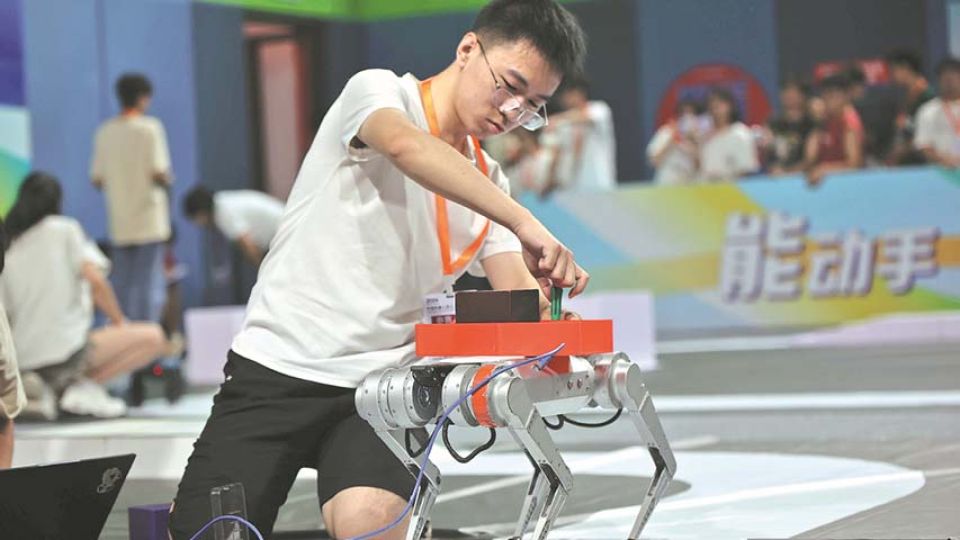August 20, 2024
BEIJING – Chinese employers are in a tight race and offering fat salaries as they scramble for talent with artificial intelligence knowledge or learning background, hoping to gain the advantage for future business expansion.
The recruitment portal Liepin recently released a report showing that the numbers of job openings and job seekers surged in the sector of AI-generated content, or AIGC, in the first quarter of the year. Specifically, AIGC-related job openings soared 321.7 percent year-on-year during the quarter, and the number of job seekers rose nearly 947 percent.
With the hiring race heating up, the recruiting salary offered by employers also shot upward. Liepin said in the report that the average annual salary for AIGC-related jobs was about 408,700 yuan ($57,045), with most of the jobs offering above 500,000 yuan per year.
Larger cities and those with internet titans — including Beijing, Shanghai, Shenzhen in Guangdong province and Hangzhou in Zhejiang province, where big tech companies such as Alibaba, Tencent and ByteDance are located — offer most AI-related job opportunities.
ByteDance, for example, launched a recruitment campaign in late May to attract graduates with doctoral degrees, after it ramped up efforts to compete in the AI universe. The campaign, named Top Seed, is aimed at grads with PhDs who are interested in machine learning, AI, large language models and audio and video generation, and the company says it offers high salaries, although it didn’t disclose exact figures.
In a reflection of the tight global race to attract AI talent, Tesla CEO Elon Musk said in April on the social platform X that his company was increasing salaries and compensation for staff members on Tesla’s AI engineering team, after OpenAI, an AI research organization in the United States, attempted to lure away employees on his team.
Pang Shi, director of the Chinese Academy of Personnel Science’s department of employment and entrepreneurship, said: “The increasing AI-related job openings and the market’s demand for talent of this kind are a result of technology advancement and industrial development. The market’s demand for AI talent will keep growing in the next few years, allowing for companies’ continuous investment and the government’s support policies in the sector.
“AI’s extensive use in diversified sectors such as healthcare, finance and transportation will also drive employers’ hiring for a workforce of this kind,” Pang said, adding that the hiring spree for AI talent is not just a fad, but will be a regular pursuit in the future.
Zhang Yuejia, president of Zhaopin, another recruitment portal, said that around 2020, the need for AI talent began to emerge, and the need surged after ChatGPT, a chatbot and virtual assistant developed by OpenAI, hit the market in 2022.
“For example, job openings on our platform concerning large language model development skyrocketed 605 percent in the first half of the year, compared with that in 2023,” he said.
“Also, job openings on natural language processing — one of the core vacancies in AI — surged 126 percent year-on-year in the first quarter, and the average monthly salary offered for the job was up 12 percent year-on-year,” Zhang added.
However, AI-related jobs have higher standards for people’s educational background and work experience, with versatile and highly skilled candidates preferred by employers. In addition, cutting-edge AI technology has brought about new job opportunities as well as challenges.
Global consultancy McKinsey & Co projected last year that China’s need for AI-related workers would grow by 2030 from 1 million to 6 million. However, local and overseas universities, as well as existing top-tier talent, could only provide one-third of the necessary talent, leaving a shortage of about 4 million.
“A worker or job seeker is required not only to have broader knowledge and a good understanding of the AI industry and innovation for commercial transition, but also strong abilities in team working, coordinating and problem solving, and advanced ideas of AI’s influence on ethics, laws and social development to ensure that the technology is used legally and responsibly,” Zhang said.
He added that employers’ increasing efforts to develop AI-related jobs and attract talent are a result of technology advancement and companies’ need for transformation.
“A workforce proficient in AI technology is becoming the key resource in business competition, as the trailblazing technology has great potential in improving productivity, optimizing work procedures and innovating new products and services, which will be a strong booster for the enterprises to expand their business landscape,” he said.
Pang, the researcher, suggested that young people adapt to the recruitment trend by closely following the AI industry’s developments and updating their knowledge and skills.
“It’s better to gain AI-related certificates or official recognition and make themselves into a many-sided person with interdisciplinary knowledge of AI and healthcare, as well as, finance and education,” she added.


